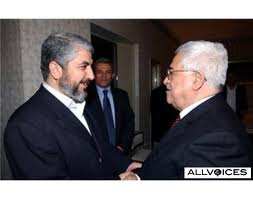
United in their support for Palestinian victims of Israeli attacks, rival groups Fatah and Hamas are putting their hostilities aside. The battle with Israel is also improving Hamas’ standing in Gaza and the West Bank.
Israel will never conquer the Gaza Strip – those were the words of the exiled Hamas leader Khaled Meshaal, and while amply defiant, they were presumably addressed to Palestinians rather than Israelis. In the face of the continuing bombardment of Gaza, even Fatah is siding with its rival Hamas as images of Palestinian victims of Israeli attacks lead the groups’ leaders to paper over their differences for now.
Omar Shaban from Pal-Think, a Gaza-based think tank, said he believes Israel misjudged the antagonism between the two Palestinian organizations. The Israeli leadership assumed that that the “Palestinian Authority in Ramallah would be happy with the Israeli strike against Hamas,” Shaban told Deutsche Welle.
In fact, the attacks may improve relations between the two Palestinian political organizations. “[Fatah head and Palestinian President] Abbas made it clear that attack against Gaza is an attack against the whole Palestinian people,” Shaban said.
Hamas and Fatah vying for political power
Maren Koß, an expert on Hamas at the German Institute for Global and Area Stuidies in Hamburg said the attacks improved Hamas’ standing among Palestinians, the majority of whom oppose the power struggle between the two organizations. While Fatah, which controls the West Bank, is committed to diplomacy, Gaza-based Hamas has never renounced the armed struggle against Israel. The two organizations have long vied for power and influence among Palestinians.
Israel’s attacks may be shifting the balance of power towards Hamas, Koß told DW.
Israeli political scientist Yitzhak Reiter from Ashkelon Academic College agreed. He said Hamas leadership has been unable to improve living conditions in Gaza and need to show they have taken some type of decisive action.
“They need to prove to the Palestinians in the West Bank that they are in fact able to achieve a lot and that they remain committed to their ideology of challenging Israel,” Reiter told DW.
Some willingness to negotiate
Hamas, an acronym for “Islamic Resistance Movement,” was founded in 1987. Its expressed objective is the elimination of the state of Israel, as various Hamas leaders have reiterated. The organization has committed several attacks on Israelis. Many Western countries, including Germany, view Hamas as a terrorist organization.
Yet, some individual Hamas leaders have expressed their willingness to negotiate under a particular set of conditions. They are willing to resume talks on the condition of Israel withdrawing to the 1967 borders.
“They may also be able to negotiate indirectly with the help of Egypt or Qatar,” Reiter said, adding that such talks could at the most result in armistice agreements of five to 10 years.
So far, Israel has repeatedly refused to conduct direct talks with Hamas.
Salafists in their backyard
Hamas doesn’t only have Fatah to worry about. Several radical, armed Salafist groups have moved into Gaza and have launched independent attacks Israel. Koß was unable to say whether Salafist attacks may have intensified the escalating violence. “Hamas isn’t able to control the whole of Gaza,” she said.
Hamas is by no means an homogeneous organization. Ismail Haniya heads the group in the Gaza Strip while Khaled Meshaal represents the leadership in exile. For the last 15 years, he has been operating in various Arabian capitals. Recently, Qatar has been his city of choice.
These two branches don’t always follow the same objectives. Haniya and his followers feel that the events of the Arab spring have overshadowed the Palestinians’ plight. The fraction around Meshaal, Koß said, is lobbying the Arab World for political recognition for itself.
Egypt and Qatar
Through their financial and even military assistance, several Arab states have gained influence on the leadership in Gaza City. The Emir of Qatar recently promised half a billion dollars for economic development.
The Egyptian Muslim brotherhood is particularly influential, given the ideological proximity of the Brothers and Hamas.
“Hamas and the Palestinians expect a lot from [Egyptian President Mohammed] Morsi,” Palestinian Omar Shaban said. While they realize that Egypt’s hands are tied by the peace agreement with Israel, Palestinians nevertheless expect “the new Egypt to work intensively with other international actors such as America, the UK, Germany, and the EU to pressure Israel to stop its aggression and stop the siege on Gaza.”
Egypt’s Prime Minister Hisham Kandil visited Gaza on Friday (16.11.2012) and expressed his solidarity with Hamas.
At the same time, the Egyptian government is unwilling to forge too close ties with Hamas, Koß told DW. The leadership in Gaza wants to negotiate a free-trade zone with Egypt.
“But the Muslim Brothers remain skeptical because they don’t want to endanger their relations with other countries,” she said.
It is unclear how much more destruction the attacks will wreck upon Gaza. Koß, however, said she is convinced that, in the end, the conflict will strengthen Hamas.
DW.DE

Leave a Reply
You must be logged in to post a comment.